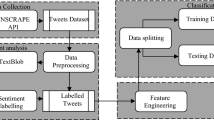Abstract
Using techniques such as machine learning (ML), natural language processing (NLP), data mining, and artificial intelligence (AI), sentiment analysis mines, extracts, and categorises user opinions provided on a business, product, person, service, event, or idea. The researchers utilised this emerging strategy to determine how social media users opinion on Tokyo 2022 Olympic and Paralympic Games. The main focus is on the fact that the Olympic Games in 2020 are significant when compared to other major international sporting events since they will be the first major gaming tournament to be staged after the pandemic. In this study, a novel approach known as content analysis and topic analysis were utilised. The main dataset utilised for this study is the tweets that used the hashtag #tokyo2022, the dataset composes of the data collected over the period of a week prior to the event. In total, 18,000 tweets were used. Here, a machine learning model is developed with the help of the tweepy.py module of the Python programming language. To collect data, the strategy of topic analysis was utilised, and the implementation of the AI technique is made possible by using the Twitter API. The collected data is then analysed by NVIVO AI to determine its theme, the polarity of its sentiment, and the frequency of its words. According to the data, there has been a favourable development in the situation and may assume that this is because of the pandemic caused by COVID-19.
Access this chapter
Tax calculation will be finalised at checkout
Purchases are for personal use only
Similar content being viewed by others
References
Annaka S, Hara T (2021) What attitude did the Japanese news media take toward the 2020 Tokyo Olympic games? Sentiment analysis of the Japanese newspapers. OSF Preprints, p 12
Bai L, Zhou Z, Li B, Liu Y, Shao Z, Wu H (2021) The construction of the eventic graph for the political field. J Chin Inf Process 35:66–74+82
Balahur A et al (2013) Sentiment analysis in the news. arXiv preprint arXiv:1309.6202
Beigi G, Hu X, Maciejewski R, Liu H (2016) An overview of sentiment analysis in social media and its applications in disaster relief. In: Sentiment analysis and ontology engineering, pp 313–340
Cardinale M (2021) Preparing athletes and staff for the first pandemic Olympic games. J Sports Med Phys Fitness
Dave K, Lawrence S, Pennock DM (2003) Mining the peanut gallery: opinion extraction and semantic classification of product reviews. In: Proceedings of the twelfth international World Wide Web conference, WWW 2003, Budapest, Hungary, 20–24 May, pp 519–528
Essex S, Chalkley B (1998) Olympic games: catalyst of urban change. Leis Stud 17(3):187–206
Feldman R (2013) Techniques and applications for sentiment analysis. Commun ACM 56(4):82. https://doi.org/10.1145/2436256.2436274
Gao W, Peng M, Wang H, Zhang Y, Han W, Hu G, Xie Q (2020) Generation of topic evolution graphs from short text streams. Neurocomputing 383:282–294
Kirilenko AP, Stepchenkova SO (2017) Sochi 2014 Olympics on Twitter: perspectives of hosts and guests. Tour Manage 63:54–65
Liu B (2012) Sentiment analysis and opinion mining. Synthesis lectures on human language technologies, vol 5(1), pp 1–167
Ma Z, Tu Y (2019) Online emerging topic content monitoring based on knowledge graph. Inf Sci 37:33–39
Mascareño A, Ruz G (2021) Sentiment analysis of Twitter data during critical events through Bayesian networks classifiers
Nickerson DW, Rogers T (2014) Political campaigns and big data. J Econ Perspect 28(2):51–74
Pak A, Paroubek P (2010) Twitter as a corpus for sentiment analysis and opinion mining. In: Proceedings of the seventh international conference on language resources and evaluation (LREC’10)
Saif H, He Y, Alani H (2012) Semantic sentiment analysis of twitter. In: International semantic web conference. Springer, Berlin, Heidelberg, pp 508–524
Sayyadi H, Raschid L (2013) A graph analytical approach for topic detection. ACM Trans Internet Technol (TOIT) 13(2):1–23
Sharma S, Gupta V (2021) Rio Olympics 2016 on Twitter: a descriptive analysis. In: Computational methods and data engineering. Springer, Singapore, pp 151–162
Shi L, Du J, Liang M, Kou F (2019) Dynamic topic modeling via self-aggregation for short text streams. Peer-to-peer Network Appl 12(5):1403–1417
Wang L (2020) Information studies: theory and application. Summary Res Meth Pract Network Public Opinion Manage Knowl Graph 43:97–101
World Health Organization. WHO Director-General’s opening remarks at the media briefing on COVID-19-16 March 2020 [EB/OL]. (2020-03-16) [2020-03-20]. https://www.who.int/dg/speeches/detail/who-director-general-s-opening-remarks-at-the-media-briefing-on-covid-19-16-march-2020
Yu J, Zhu L (2022) A study of emotion setting based on event evolutionary graph-Take microblog users’ expression of emotions on news reports related to the Beijing Winter Olympics as an example. ITM Web Conf 45:01041
Zhou JY, Liu R, Li JY, Wu CS (2018) Study on the concept and value of intelligence event evolutionary graph. J Intell 37(05):31–36
Zhu H (2019) Research on the causality of aviation safety accident based on event evolutionary graph. Civil Aviation University of China
Zhu H, Kong Y, Wei J, Ma J (2018) Effect of users’ opinion evolution on information diffusion in online social networks. Phys A 492:2034–2045
Author information
Authors and Affiliations
Corresponding author
Editor information
Editors and Affiliations
Rights and permissions
Copyright information
© 2023 The Author(s), under exclusive license to Springer Nature Singapore Pte Ltd.
About this paper
Cite this paper
Sachdeva, P., Mitra, A. (2023). Decoding the Twitter Sentiment Using Artificial Intelligence Tools: A Study on Tokyo Olympics 2020. In: Ranganathan, G., Papakostas, G.A., Rocha, Á. (eds) Inventive Communication and Computational Technologies. ICICCT 2023. Lecture Notes in Networks and Systems, vol 757. Springer, Singapore. https://doi.org/10.1007/978-981-99-5166-6_37
Download citation
DOI: https://doi.org/10.1007/978-981-99-5166-6_37
Published:
Publisher Name: Springer, Singapore
Print ISBN: 978-981-99-5165-9
Online ISBN: 978-981-99-5166-6
eBook Packages: Intelligent Technologies and RoboticsIntelligent Technologies and Robotics (R0)




